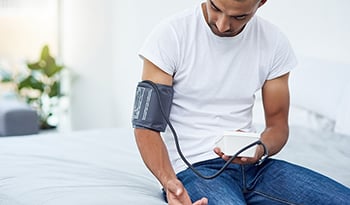Cardiovascular Health and Travel
DISCLAIMER:This blog does not intend to provide diagnosis...
- In this article:
- 14 Things to Consider Prior to Traveling with High Blood Pressure
- Visit your Doctor
- Know Your Numbers
- Make Sure Your Vaccinations Are Current
- Keep your Medications in Your Carry-on Luggage
- Bring Along Extra Medications
- Bring a Medication List
- Familiarize Yourself with Emergency Service Near Your Destination
- Know Your Local Pharmacy Options
- Consider Travel Insurance
- Take Snacks with You
- Bring a Cooler on Your Road Trip
- Don't Rely on Airport Food
- Don’t Go Overboard on Cruise Ship Buffets
- Plan Ahead, Have a Great Trip
- Supplements which May Help Control Blood Pressure
- Co-Enzyme Q10
- Magnesium
- Pycnogenol
- Vitamin D

Billions of people fly every year, and tens of millions of these travelers have high blood pressure. Also known as hypertension, high blood pressure is one of the leading risk factors for developing heart disease, heart attack or stroke. While traveling with high blood pressure is generally safe as long as it’s under control, there are a few things to consider before you head out of town. Follow these guidelines to stay healthy and comfortable on your next trip.
14 Things to Consider Prior to Traveling with High Blood Pressure
Visit your Doctor
Schedule a visit with your doctor to make sure you are current with your blood tests and in optimal health prior to travel. You may need to get blood tests to ensure that your medication dosages are correct. Some blood pressure medications can affect your electrolytes, and a blood test can detect this abnormality if present. Ask your physician if your blood pressure is stable enough to travel, and if you’ve experienced any changes in your health since your last visit, be sure to let your doctor know. Don’t wait until the last minute—remember, test results can take time, so be sure to schedule your appointment at least a few weeks before you’re scheduled to leave.
Know Your Numbers
Once you’ve been given the green light to travel by your doctor, make sure you maintain a healthy blood pressure while you’re away. In order to do that you must know what your healthy blood-pressure numbers are and monitor to make sure they stay under control. If you don’t already have one, consider purchasing a digital blood pressure monitor, which will allow you to measure your blood pressure from anywhere (most studies suggest monitors that use an arm cuff are more accurate than those that fit on the wrist). Keep in mind that many pharmacies in the U.S. have blood pressure machines for customers to use if you don’t own one, but they might not be readily available in every area or in every country.
Normal Adult Blood Pressure: 100-130/60-80 mmHg
Hypertension: If greater than 140/90 (or 130/80 per the American Heart Association)
Make Sure Your Vaccinations Are Current
Depending on the location you’re headed to and time of the year you’re traveling, certain vaccinations may be recommended. In general, adults with chronic conditions, including heart disease, can be more prone to contracting and more intensely affected by certain infections, like the flu. Ask your physician to review your vaccination history and ensure you are up to date. You can also visit the Centers for Disease Control, or CDC website to see which vaccinations are recommended for different countries around the world.
Keep your Medications in Your Carry-on Luggage
Airlines lose luggage every day. Chances are it’s happened to you or someone you know. Because it's so common, it’s very important that you keep your medications on your person. If your bags are misplaced, it could take days to have them returned to you. You also run the risk of having your medications lost permanently. Play it safe and keep all medical supplies in your carry-on luggage. Make sure all containers are properly closed and secure as items tend to shift during flights.
Bring Along Extra Medications
If you are planning on traveling for an extended period of time, you should make sure you have enough medications to last you for at least twice the duration of your trip in the event of unforeseen delays. If you normally get 30 days’ worth of medications from the pharmacy, ask your doctor for a 90-day supply. Additionally, if you’re planning a day trip or tour that takes you away from where you are staying, be sure to bring along extra medication in case it lasts longer than expected. Going off your medication schedule can, at the minimum, cause discomfort—more seriously, it could cause life-threating complications.
Common medications used to treat high blood pressure include the following:
- Ace-inhibitors: lisinopril, benazepril, enalapril
- Angiotensin Receptor Blockers: losartan, valsartan
- Beta-blockers: atenolol, carvedilol, metoprolol
- Calcium Channel Blockers: amlodipine, diltiazem
- Diuretics: hydrochlorothiazide, chlorthalidone, triamterene
If you are on any of these medications, it’s imperative that you make sure you have enough for your trip.
Bring a Medication List
Keep a written list of all your medications in your wallet or travel bag. Write down the name, dosage (mg) and the frequency (i.e. once per day, twice per day, etc.). This can be helpful in case you lose your medications or if you are out of the hotel and need to seek emergency medical services.
Familiarize Yourself with Emergency Service Near Your Destination
No matter where you are headed, make sure you’re aware of what medical services are available in the unlikely event you may need them. Before you arrive or upon checking in, ask your hotel if there are urgent care medical clinics or hospitals nearby, in case you need one. If you’re traveling on a cruise ship, inquire about the medical services they provide aboard the ship prior to booking. Avoid surprises when it comes to your health—don’t wait until you’re actually experiencing a medical emergency to learn your care options. Find out before you go or as soon as you get to your destination!
Know Your Local Pharmacy Options
Some medications, which may be available by prescription only in your country, might be available over the counter in the place you’re are traveling—or vice versa. Either way, you’ll need to know where to go to get your prescriptions filled if necessary. Map out where local pharmacies are located, and keep their addresses in your phone or on a slip of paper in your wallet. Make sure you have your medication list handy at all times in case you misplace or lose your medications.
Consider Travel Insurance
Before you leave, call your health insurance company and ask them if they provide coverage or reimbursement for healthcare services you may need while you are traveling. If not, consider purchasing separate travel insurance prior to your departure—a search on the internet can show you companies that can offer this coverage. You don’t want to ruin your trip with the added stress of unexpected medical bills, some of which may need to be paid on the spot. If you can afford it, extra insurance is well worth the cost.
Take Snacks with You
Maintaining good blood pressure control can be a challenge when you travel due to changes in routine, disruptions to exercise schedules and the likelihood that you’ll be eating in restaurants more than you and your body are used to. Packing healthy, low-sodium snacks can be crucial to staying in balance. Also, it’s very important to ask about low-sodium options when eating out.
Bring a Cooler on Your Road Trip
Are you taking a road trip? When traveling by automobile, it’s easy will rely on drive-thru fast food restaurants. However, these foods frequently include a lot of sodium, simple carbohydrates and processed ingredients that can cause spikes in blood pressure. Bring a portable cooler, and fill it with fruits, vegetables and other healthy snacks that’ll keep you satisfied even after hours on the road. Studies show a diet high in fruits and vegetables are important to help keep blood pressure stabilized. Many take Green Superfood supplements to help ensure they are getting adequate phytonutrients.
Healthy snack options to pack in a cooler:
- Protein Bars
- Fruits
- Vegetables
- Nuts and seeds: almonds, Brazil nuts, cashews, pecans, pistachios and pumpkin seeds
- Whey or plant-based protein powder shakes are good meal replacements that’ll keep you satisfied
Don't Rely on Airport Food
If you’re traveling by airplane and spending time in the airport, getting a healthy meal can be a real challenge. Most of the food available in restaurants and shops are full of sodium and very processed. You want to make sure to meal prep. Pack your own breakfast, lunch or dinner and bring along healthy snacks, too. Remember: airports don’t allow large bottles of liquids, so smoothies and shakes might not make it through security. However, many other healthy snacks will!
Don’t Go Overboard on Cruise Ship Buffets
Most cruise ships have all-you-can-eat buffets, and they are very tempting—there are so many options that it’s easy to overdo it. Fill up on veggies and salad and go light on everything else. If you’re traveling in the summer in hot and humid weather, you might retain more sodium than usual along with extra fluid. Additionally, if the weather is hot and alcohol is consumed, dehydration can quickly set in and blood pressure can become elevated.
Plan Ahead, Have a Great Trip
Planning ahead is the key to success no matter when, where, or how you are traveling. Taking adequate time to plan out your travel route, accommodations and eating options can help you continue to travel the world no matter what health conditions you may have. It may take extra time and effort, but your health and comfort are absolutely worth it. Bon voyage!
Supplements which May Help Control Blood Pressure
Co-Enzyme Q10
Co-Enzyme Q10 plays an important role in the health of mitochondria, the powerhouses of our cells. Studies show it can also help with high blood pressure. The Mayo Clinic backs use of CoQ10 for high blood pressure as did a 2015 study in the Annals of Medicine. Suggested dose: 100 mg to 300 mg daily is recommended.
Magnesium
Magnesium is an important mineral and enzyme co-factor involved in over 350 biochemical reactions in the human body. An adequate intake of magnesium-rich foods, which include green, leafy vegetables, is crucial. Frequently, diet is not enough and a supplement is required.
Certain medications increase the risk of a magnesium deficiency. These medications include stomach acid reducers (i.e. omeprazole, pantoprazole, ranitidine) and diuretic blood pressure lowering pills (i.e. furosemide, triamterene, hydrochlorothiazide).
A 2016 study showed that magnesium could help lower blood pressure when taken for as little as one month. In addition, a 2017 study showed a similar reduction of blood pressure by magnesium in those with insulin resistance, or prediabetes.
Pycnogenol
A potent antioxidant, Pycnogenol, or pine bark extract, was originally used by indigenous people of North America and Asia as a medicinal herb. French expeditioner Jacques Cartier, who claimed Canada for France, reportedly used pine bark extract in 1535 during his expedition as a treatment for scurvy, a condition caused by insufficient vitamin C intake.
Today, integrative healthcare professionals have also realized the many health and anti-aging benefits of pine bark extract, which was first introduced into the United States as a dietary supplement in 1987. According to a 2016 study in Phytomedicine, this herb can help lower blood pressure.
Vitamin D
While there are many reasons a person develops high blood pressure, studies show that men with lower levels of vitamin D are six times more likely to have hypertension while women were almost three times more likely.
So, what can vitamin D do? Scientific studies show vitamin D helps relax the blood vessels, which carry blood throughout our body, resulting in lower blood pressure. Vitamin D deficiency may also account for a major reason those with increased skin pigmentation are at higher risk for high blood pressure. Suggested dose: 2,000 – 5,000 IU daily.
References:
- Borghi, C., and Cicero, A. F. G. (2017) Nutraceuticals with a clinically detectable blood pressure-lowering effect: a review of available randomized clinical trials and their meta-analyses. Br J Clin Pharmacol, 83: 163–171. doi: 10.1111/bcp.12902.
- http://www.mayoclinic.org/drugs-supplements/coenzyme-q10/evidence/hrb-20059019
- Nutraceuticals for blood pressure control Cesare R. Sirtori, Anna Arnoldi & Arrigo F. G. Cicero Annals of Medicine Vol. 47 , Iss. 6,2015
- Hypertension. 2016 Aug;68(2):324-33. doi: 10.1161/HYPERTENSIONAHA.116.07664. Epub 2016 Jul 11.
- Am J Clin Nutr. 2017 Sep;106(3):921-929. doi: 10.3945/ajcn.117.155291. Epub 2017 Jul 19.
- Complement Ther Med. 2017 Feb;30:14-23. doi: 10.1016/j.ctim.2016.11.004. Epub 2016 Nov 18.

 By Dr. Eric Madrid, M.D.
By Dr. Eric Madrid, M.D.


